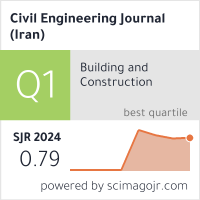Uncertainty Analysis of Regional Rainfall Frequency Estimates in Northeast India
Downloads
Doi:10.28991/cej-2021-03091762
Full Text:PDF
Downloads
[2] Tasker, Gary, J. R. M. Hosking, and J. R. Wallis. Regional Frequency Analysis: An Approach Based on L-Moments. Journal of the American Statistical Association. Vol. 93. University Press, Cambridge, 1998. doi:10.2307/2669866.
[3] Hazarika, Jayshree, and Arup Kumar Sarma. "Importance of Regional Rainfall Data in Homogeneous Clustering of Data-Sparse Areas: A Study in the Upper Brahmaputra Valley Region.” Theoretical and Applied Climatology 145, no. 3–4 (2021): 1161–75. doi:10.1007/s00704-021-03686-x.
[4] Debbarma, Nilotpal, Parthasarathi Choudhury, and Parthajit Roy. "Identification of Homogeneous Rainfall Regions Using a Genetic Algorithm Involving Multi-Criteria Decision Making Techniques.” Water Science and Technology: Water Supply 19, no. 5 (2019): 1491–99. doi:10.2166/ws.2019.018.
[5] Goyal, Manish Kumar, and Vivek Gupta. "Identification of Homogeneous Rainfall Regimes in Northeast Region of India Using Fuzzy Cluster Analysis.” Water Resources Management 28, no. 13 (2014): 4491–4511. doi:10.1007/s11269-014-0699-7.
[6] Deka, S, M Borah, and S C Kakaty. "Distributions of Annual Maximum Rainfall Series of North-East India.” European Water 1, no. 27/28 (2009): 3–14.
[7] Deka, Surobhi, Munindra Borah, and Sarat Chandra Kakaty. "Statistical Analysis of Annual Maximum Rainfall in North-East India: An Application of LH-Moments.” Theoretical and Applied Climatology 104, no. 1–2 (2011): 111–22. doi:10.1007/s00704-010-0330-7.
[8] Hailegeorgis, Teklu T., and Knut Alfredsen. "Regional Flood Frequency Analysis and Prediction in Ungauged Basins Including Estimation of Major Uncertainties for Mid-Norway.” Journal of Hydrology: Regional Studies 9 (2017): 104–26. doi:10.1016/j.ejrh.2016.11.004.
[9] Souza, Rezende de, Merwade G., Coutinho de Oliveira V., and Viola L. F. "M.” R., and Sa Farias, M. ``Regional Flood Frequency Analysis and Uncertainties: Maximum Streamflow Estimates in Ungauged Basins in the Region of Lavras, MG, Brazil 197 (2021): 10497. https://doi.org/10.1016/j.catena.2020.104970.
[10] Liang, Yuyin, Shuguang Liu, Yiping Guo, and Hong Hua. "L-Moment-Based Regional Frequency Analysis of Annual Extreme Precipitation and Its Uncertainty Analysis.” Water Resources Management 31, no. 12 (2017): 3899–3919. doi:10.1007/s11269-017-1715-5.
[11] Zhu, Qian, Haiting Gu, Xujie Zhang, and Yue-Ping Xu. "Parameter Uncertainty and Nonstationarity in Regional Rainfall Frequency in Qu River Basin, East China.” Journal of Hydrologic Engineering 21, no. 5 (2016): 04016008. doi:10.1061/(asce)he.1943-5584.0001355.
[12] Zhou, Zhengzheng, Shuguang Liu, Hong Hua, Chang-Shian Chen, Guihui Zhong, Hejuan Lin, and Chien-Wei Huang. "Frequency Analysis for Predicting Extreme Precipitation in Changxing Station of Taihu Basin, China.” Journal of Coastal Research 68 (2014): 144–51. doi:10.2112/si68-019.1.
[13] Merz, Bruno, and Annegret H. Thieken. "Separating Natural and Epistemic Uncertainty in Flood Frequency Analysis.” Journal of Hydrology 309, no. 1–4 (2005): 114–32. doi:10.1016/j.jhydrol.2004.11.015.
[14] Kajbaf, Azin Al, and Michelle Bensi. "Assessment of Uncertainty in Regional and At-Site Precipitation Frequency Analysis for the Localized Region of Ellicott City, Maryland.” Natural Hazards 108, no. 3 (2021): 2513–41. doi:10.1007/s11069-021-04786-7.
[15] Li, Mengrui, Xiaodong Li, and Tianqi Ao. "Comparative Study of Regional Frequency Analysis and Traditional At-Site Hydrological Frequency Analysis.” Water (Switzerland) 11, no. 3 (2019): 486. doi:10.3390/w11030486.
[16] Goudenhoofdt, Edouard, Laurent Delobbe, and Patrick Willems. "At-Site and Regional Frequency Analysis of Extreme Precipitation from Radar-Based Estimates.” Hydrology and Earth System Sciences, 2017, 1–26. doi:10.5194/hess-2017-150.
[17] Cullen, Alison C., and H. Christopher Frey. Probabilistic Techniques in Exposure Assessment: A Handbook for Dealing with Variability and Uncertainty in Models and Inputs, Springer, Berlin, (1999).
[18] Zhang, Wei, and Tian Li. "The Influence of Objective Function and Acceptability Threshold on Uncertainty Assessment of an Urban Drainage Hydraulic Model with Generalized Likelihood Uncertainty Estimation Methodology.” Water Resources Management 29, no. 6 (2015): 2059–72. doi:10.1007/s11269-015-0928-8.
[19] Sha, Jian, Zeli Li, Dennis P. Swaney, Bongghi Hong, Wei Wang, and Yuqiu Wang. "Application of a Bayesian Watershed Model Linking Multivariate Statistical Analysis to Support Watershed-Scale Nitrogen Management in China.” Water Resources Management 28, no. 11 (2014): 3681–95. doi:10.1007/s11269-014-0696-x.
[20] Zheng, Yi, and Feng Han. "Markov Chain Monte Carlo (MCMC) Uncertainty Analysis for Watershed Water Quality Modeling and Management.” Stochastic Environmental Research and Risk Assessment 30, no. 1 (2016): 293–308. doi:10.1007/s00477-015-1091-8.
[21] Nguyen, Duc Hai, Seon Ho Kim, Hyun Han Kwon, and Deg Hyo Bae. "Uncertainty Quantification of Water Level Predictions from Radar"based Areal Rainfall Using an Adaptive MCMC Algorithm.” Water Resources Management 35, no. 7 (2021): 2197–2213. doi:10.1007/s11269-021-02835-1.
[22] Ridolfi, E., M. Rianna, G. Trani, L. Alfonso, G. Di Baldassarre, F. Napolitano, and F. Russo. "A New Methodology to Define Homogeneous Regions through an Entropy Based Clustering Method.” Advances in Water Resources 96 (2016): 237–50. doi:10.1016/j.advwatres.2016.07.007.
[23] Harmancioglu, Nilgun, and Vujica Yevjevich. "Transfer of Hydrologic Information among River Points.” Journal of Hydrology 91, no. 1–2 (1987): 103–18. doi:10.1016/0022-1694(87)90131-4.
[24] Rajsekhar, Deepthi, Ashok K. Mishra, and Vijay P. Singh. "Regionalization of Drought Characteristics Using an Entropy Approach.” Journal of Hydrologic Engineering 18, no. 7 (2013): 870–87. doi:10.1061/(asce)he.1943-5584.0000683.
[25] Yang, Yujuin, and Donald H. Burn. "An Entropy Approach to Data Collection Network Design.” Journal of Hydrology 157, no. 1–4 (1994): 307–24. doi:10.1016/0022-1694(94)90111-2.
[26] Du, Hong, Jun Xia, and Sidong Zeng. "Regional Frequency Analysis of Extreme Precipitation and Its Spatio-Temporal Characteristics in the Huai River Basin, China.” Natural Hazards 70, no. 1 (2014): 195–215. doi:10.1007/s11069-013-0808-6.
[27] Jin, Xiaoli, Chong Yu Xu, Qi Zhang, and V. P. Singh. "Parameter and Modeling Uncertainty Simulated by GLUE and a Formal Bayesian Method for a Conceptual Hydrological Model.” Journal of Hydrology 383, no. 3–4 (2010): 147–55. doi:10.1016/j.jhydrol.2009.12.028.
[28] Uboldi, F., A. N. Sulis, C. Lussana, M. Cislaghi, and M. Russo. "A Spatial Bootstrap Technique for Parameter Estimation of Rainfall Annual Maxima Distribution.” Hydrology and Earth System Sciences 18, no. 3 (2014): 981–95. doi:10.5194/hess-18-981-2014.
[29] Lall, Upmanu, and Ashish Sharma. "A Nearest Neighbor Bootstrap for Resampling Hydrologic Time Series.” Water Resources Research 32, no. 3 (1996): 679–93. doi:10.1029/95WR02966.
[30] Xu, Sudong, and Wenrui Huang. "Estimating Extreme Water Levels with Long-Term Data by GEV Distribution at Wusong Station near Shanghai City in Yangtze Estuary.” Ocean Engineering 38, no. 2–3 (2011): 468–78. doi:10.1016/j.oceaneng.2010.11.022.
[31] Ljung, G. M., and G. E.P. Box. "On a Measure of Lack of Fit in Time Series Models.” Biometrika 65, no. 2 (1978): 297–303. doi:10.1093/biomet/65.2.297.
[32] Atiem, Isameldin A., and Nilgün B. Harmancioǧlu. "Assessment of Regional Floods Using L-Moments Approach: The Case of the River Nile.” Water Resources Management 20, no. 5 (2006): 723–47. doi:10.1007/s11269-005-9004-0.
[33] Yin, Yixing, Haishan Chen, Chong Yu Xu, Wucheng Xu, Changchun Chen, and Shanlei Sun. "Spatio-Temporal Characteristics of the Extreme Precipitation by L-Moment-Based Index-Flood Method in the Yangtze River Delta Region, China.” Theoretical and Applied Climatology 124, no. 3–4 (2016): 1005–22. doi:10.1007/s00704-015-1478-y.
- Authors retain all copyrights. It is noticeable that authors will not be forced to sign any copyright transfer agreements.
- This work (including HTML and PDF Files) is licensed under a Creative Commons Attribution 4.0 International License.![]()















